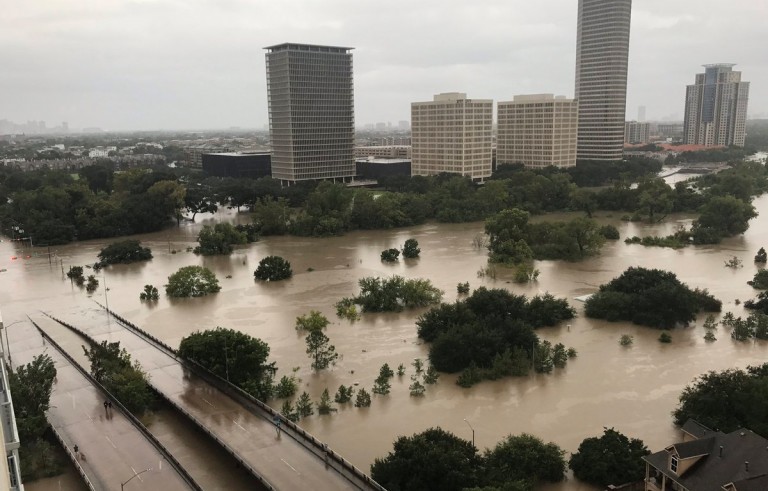HARI SREENIVASAN, PBS NEWSHOUR WEEKEND ANCHOR: Nine years ago, when Hurricane Ike caused $30 billion of property damage in the Houston and Galveston area, it was a wakeup call. But according to the report "Hell or High Water," published last year by "ProPublica" and the "Texas Tribune," Houston did not adequately heed the warning.
"Texas Tribune" reporter Kiah Collier is one of the co-authors of that story. She's also covering Harvey today. She joins me now via Skype to discuss Houston's preparedness for storms like this.
You worked on this for more than a year. What did you find? I mean, we know that there's hurricane preparations and then there's flood preparations and you have a story just on that.
KIAH COLLIER, REPORTER, TEXAS TRIBUNE: So, the projects were to focus on Houston's vulnerability to hurricanes and then flooding and how flooding has been exacerbated by unchecked development in Houston. Building rules are not too strict, and developers are just paving, you know, over prairie land and wetlands, and not thinking too much about it. And when rains like this hit, it just makes it so much worse because those flood waters don't have anywhere to go.
And, of course, you know, with hurricanes comes rain. And, you know, there's a big question whether Harvey would hit Houston as a hurricane. It was never projected to do that. But we wrote about a specific hurricane that if it hits at a particular point on the coast, it would send an enormous storm surge into a highly populated area and the U.S.'s largest refining and petrochemical complex, which is here in the bayou city. That's what they call it.
SREENIVASAN: One part of your story mentioned that Houston had, what, the most urban flooding in the last 40 years?
COLLIER: Yes, that's right. Flooding kills more people here than anywhere else in the U.S. and in general. I mean, flooding kills a lot of people, more than have been hurricanes actually. So, it's the number one killer, in terms of natural disasters.

SREENIVASAN: So, when you look at these beautiful sets of maps that you have and you look at sort of 100 year storms and 500 year storms, you can kind of layer this over into where these flood zones are and you see the dots just kind of line up and they go right over areas that are expected to flood.
COLLIER: Right, exactly. And these recent floods — so, this is the third major flood Houston has seen in the last three years I guess. So, there's been historic floods, you know, basically once a year for the past three years, and a lot of that flooding has occurred outside the zones that FEMA considers most likely to flood.
And today, we're seeing flooding that exceeds 500-year flood levels, which is really rare.
SREENIVASAN: You know, Houston has a flood control board. I mean, is there tension there between what scientists predict and what they say is necessary to prevent these things and how Houston develops?
COLLIER: Right. So, our project was based on, you know, a lot of interviews with scientists who said, you know, Houston is not doing enough to mitigate flooding. It's not leaving open green space in these developments. And it's only going to get worse because of climate change.
And so, we talked to the head of the flood control district for our story. And he basically didn't agree with any of that and told us that they can kind of fight concrete with concrete. You know, he's an engineer and said, you know, we can engineer our way out of this problem with this big flood retention, you know, kind of basically massive concrete, you know, public works projects that funnel the floodwaters out to the Gulf of Mexico.
And, you know, we don't have — Houston doesn't have enough of those and he admitted that this was behind on creating those projects or building those projects. But scientists that we talked to say you're not going to be able to engineer out of the problem. What Houston really needs is smarter development rules.
SREENIVASAN: All right. Kiah Collier of "The Texas Tribune", joining us via Skype form Houston today, she's one of the authors of "Boom Town, Flood Town" and "Hell or High Water". You can find like to that from our Website. Thanks so much for joining us.
COLLIER: Thank you.












